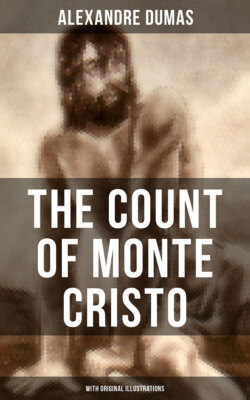Читать книгу The Count of Monte Cristo (With Original Illustrations) - Alexandre Dumas - Страница 112
На сайте Литреса книга снята с продажи.
Original
Оглавление"Such words as those belong to your profession," answered Caderousse, "and you do well to repeat them; but," added he, with a bitter expression of countenance, "one is free to believe them or not, as one pleases."
"You are wrong to speak thus," said the abbe; "and perhaps I may, in my own person, be able to prove to you how completely you are in error."
"What mean you?" inquired Caderousse with a look of surprise.
"In the first place, I must be satisfied that you are the person I am in search of."
"What proofs do you require?"
"Did you, in the year 1814 or 1815, know anything of a young sailor named Dantes?"
"Dantes? Did I know poor dear Edmond? Why, Edmond Dantes and myself were intimate friends!" exclaimed Caderousse, whose countenance flushed darkly as he caught the penetrating gaze of the abbe fixed on him, while the clear, calm eye of the questioner seemed to dilate with feverish scrutiny.
"You remind me," said the priest, "that the young man concerning whom I asked you was said to bear the name of Edmond."
"Said to bear the name!" repeated Caderousse, becoming excited and eager. "Why, he was so called as truly as I myself bore the appellation of Gaspard Caderousse; but tell me, I pray, what has become of poor Edmond? Did you know him? Is he alive and at liberty? Is he prosperous and happy?"
"He died a more wretched, hopeless, heart-broken prisoner than the felons who pay the penalty of their crimes at the galleys of Toulon."
A deadly pallor followed the flush on the countenance of Caderousse, who turned away, and the priest saw him wiping the tears from his eyes with the corner of the red handkerchief twisted round his head.
"Poor fellow, poor fellow!" murmured Caderousse. "Well, there, sir, is another proof that good people are never rewarded on this earth, and that none but the wicked prosper. Ah," continued Caderousse, speaking in the highly colored language of the south, "the world grows worse and worse. Why does not God, if he really hates the wicked, as he is said to do, send down brimstone and fire, and consume them altogether?"
"You speak as though you had loved this young Dantes," observed the abbe, without taking any notice of his companion's vehemence.
"And so I did," replied Caderousse; "though once, I confess, I envied him his good fortune. But I swear to you, sir, I swear to you, by everything a man holds dear, I have, since then, deeply and sincerely lamented his unhappy fate." There was a brief silence, during which the fixed, searching eye of the abbe was employed in scrutinizing the agitated features of the inn-keeper.
"You knew the poor lad, then?" continued Caderousse.
"I was called to see him on his dying bed, that I might administer to him the consolations of religion."
"And of what did he die?" asked Caderousse in a choking voice.
"Of what, think you, do young and strong men die in prison, when they have scarcely numbered their thirtieth year, unless it be of imprisonment?" Caderousse wiped away the large beads of perspiration that gathered on his brow.
"But the strangest part of the story is," resumed the abbe, "that Dantes, even in his dying moments, swore by his crucified Redeemer, that he was utterly ignorant of the cause of his detention."
